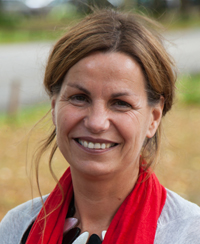KEYNOTE SPEAKERS

|
Drs. Marjan ter AvestDirector MindOfficial opening of the First International Conference on Crisis, Coercion and Intensive Treatment in Psychiatry | |

|
Brian R. Sims, MDSenior Director, Medical and Behavioral Health, National Association of State Mental Health Program DirectorsTheme: Trauma informed treatment read more Influencing Outcomes with Trauma Informed Treatment - A Baltimore Experience - Healing IN Communities
This session entitled 'Influencing Outcomes through Trauma Informed Treatment - A Baltimore Experience' -' Healing IN Communities', will focus on strategies utilized by SAMHSA's National Center for Trauma Informed Care in cooperation with the city of Baltimore, Maryland with resultant healing in communities and agencies there intended to promote healing and recovery. At the time of our initial entry into Baltimore, there was significant violence with Baltimore reaching in one year the highest number of homicides in its history. Our goal upon entry was to assist the city in its healing process; a process involving the understanding and addressing of the high prevalence of trauma interwoven in the communities. Add to this extensive Historical trauma, and the city was suffering, with no significant channel to relieve the agony or processes to address the pervasive traumas. In implementing trauma informed strategies, the attempt was to assist a city in crisis, stressing healing and subsequent beginnings of recovery. As the city sought emotional healing, it as well sought physical healing. The Adverse Childhood Experiences study will be discussed, to show the correlations of adverse experiences, many of which occurred in childhood and some even before the child had formed language to express, and how these experiences have profound emotional and physiological consequences, stressing the need for early intervention in treatment. This led to a broad range of trainings in the city, totaling to date some 78 agencies and over 2600 people.
With this collaborative, people all over Baltimore have been receiving assistance and education on strategies to not only help others but to help themselves. The key to successful and sustained effects, is to embrace prevention. This discussion promotes the addressing of trauma on both ends of the spectrum. Examples from the efforts within the city, with creation of unique, community- oriented programs will be discussed with the goals there of producing long- lasting outcomes. Concepts that promote healing; communicating effectively; embracing the premise of 'It's not what's wrong with you, but what happened to you' have become the mantra. With active collaboration, we have attempted to help individuals of all levels of expertise to understand that 'you do not have to be a therapist to be therapeutic'. Many communities and agencies have begun to emerge with strength, healing and resilience. While still a work in progress, the response from the City has displayed an overwhelming desire to heal. Close | |
 |
Dr. Gerdien FranxProgram manager National Agenda Suicide prevention, 113 Suicide Prevention, SupranetTheme: The Zero Suicide Journey read more The Zero Suicide Journey
Suicide prevention is a major health care responsibility in desperate need of new perspectives. Despite decades of research and considerable investments in health care services little progress has been made in reducing morbidity and mortality due to suicidal behavior. US suicide rates show a 24% rise between 1999 and 2014.4 In the Netherlands the suicide rate has risen with 38% in eight years, returning in 2012-2015 to peak numbers of the 1980's.5 Over 40% of Dutch inhabitants who died by suicide received specialist mental health care. From successive major systematic reviews on suicide prevention strategies6,7 it becomes clear that progress is slow. The uptake by the field of guideline best practices and recommendations seems to be even slower8 with many workers lacking specific training to work with suicidal patients.9,10 Accepting this state of affairs implies that suicide will keep killing several hundreds of thousands humans every year worldwide in the next decades. This keynote presents Zero Suicide, a new approach to suicide prevention that is gaining momentum worldwide and aims for the pursuit of zero suicides in healthcare. Zero Suicide starts from the core value that no one should die alone and in despair by suicide, and from the conviction that suicide can be prevented. It is an integral, transformative approach that applies Safety and Quality Improvement principles developed in technological sectors (e.g. aviation, automotive, energy) and in somatic healthcare on the scale of entire (mental) health care systems or institutions. Core components are: 1) a safety culture with commitment to the goal of zero suicides, 2) continuous (data driven) improvement of care processes and routines, and 3) structural and reliable use of suicide specific interventions. These components are translated into well-defined organizational behaviors (to lead; to train; to identify, engage and treat; to transition and to improve) that all contribute to patient and staff safety. Zero Suicide's optimistic and ambitious approach contrasts with the attenuated and reserved stance commonly encountered among health care staff towards the preventability of suicides, and with a current reality of losing many patients to suicide. It is a B-HAG: a Big Hairy, Audacious Goal that may evoke anxiety among frontline workers. Therefore, the first steps on the journey towards Zero Suicide are the abandonment of blame after suicide and the creation a Just Culture in which professionals feel secure to learn and improve every day. Close | |

|
Yolande Voskes, PhDAssistant professor at VU University medical centre and senior researcher at mental health institute GGZ BreburgTheme: Intensive treatment in clinical settings, prevention of seclusion and restraint read more Intensive treatment in clinical settings, prevention of seclusion and restraint
Locking a psychiatric patient in a seclusion room is a controversial practice in the Netherlands, as well as in other countries in and outside of Europe. Seclusion is a traumatic and emotional experience that has a major impact on patients with psychiatric symptoms. In recent years, mental healthcare institutions in the Netherlands started projects to reduce seclusion. These projects have resulted in improvements in mental health care and a decline in number and duration of seclusions. However, psychiatric patients are still secluded. To achieve a further reduction of seclusion and to reduce also the number of beds in mental health care institutions, a group of professionals started the development of High and Intensive Care (HIC) in mental health care. Previous research on the reduction of seclusion in the Netherlands, evidence based practices, experience based practices and consensus meetings with all stakeholders (patients, peer providers, family, nurses, psychiatrists, managers and researchers) were the basis of this new model on mental health care in the Netherlands. The HIC-model focusses on restoring and maintaining contact, crisis prevention and stepped care. It requires close collaboration with relatives and with the ambulatory teams. In order to measure the implementation of the HIC-model, the HIC-monitor has been developed. The HIC monitor is a model fidelity scale and contains of 65 items on eleven subscales to be rated using a 5-point Likert scale, in ascending order of "not implemented" to "fully implemented" At the moment all large mental health care institutions are implementing this model. A national study is done to get more insight into the implementations and the effects of HIC on coercive measures and quality of care. This keynote presents the High and Intensive Care model and will pay attention to the results of the national study on HIC.
Close | |

|
Prof. Stefan PriebeProfessor of Social and Community Psychiatry at Queen Mary University of London, UKTheme: Research, evidence, and practice of coercive treatment - what is the link? read more Research, evidence, and practice of coercive treatment - what is the link?
Coercive treatment has practically always been part of practice in mental health care, although the societal context, legal basis, and forms of coercion have changed fundamentally over the last 250 years. During the same period, psychiatry has become an academic discipline involving medicine and other sciences. Scientific disciplines commonly have the aspiration to advance through research and be evidence-based in their practice. The presentation will show the main research methods that have been applied to understand coercive treatments and their effects, summarise the existing evidence that the research has produced and explore in which way, if any, the evidence has influenced practice. It will be argued that the wide spread practice and importance of coercive treatment has hardly driven an extensive research agenda in psychiatry, and only a few aspects of coercive treatments have been studied with rigorous methods. When the studies yielded negative findings, in particular about the benefits of coercive treatment in the community, there has been a limited impact on practice. Whilst the direct links between research, evidence, and practice of coercion in psychiatry may be seen as weak, there might be more indirect links that help to maintain and shape current practice of coercion. Direct and indirect links - also considering so-called informal forms of coercion - and potential future scenarios for how coercive practice might be guided by evidence (or not) will be discussed. Close | |

|
Prof. Robert Vermeieren, MD, PhDProfessor of child and adolescent psychiatry, Leiden University Medical CenterMedical managing director of the child psychiatric clinic Curium-LUMC Professor of Forensic Child and Adolescent Psychiatry, Section of Child Psychiatry, VU University medical center, Amsterdam Member to the board of the dutch knowledge center of Child and Adolescent Psychiatry Theme: Prevention of crisis in youth mental health care read more Prevention of crisis in youth mental health care
During adolescence, major mental disorders often have their onset. Because adolescence is characterised by developmental immaturity, individual characteristics complicate interaction when they need professional help. As a result, the likelihood of acting out as well as self-destructive behaviour is substantially higher. This poses particular challenges for professionals dealing with these kids. Professionals who, only because they are adults, are more likely to be seen as stupid and thus unfit to help them. For those and many other reasons, handling adolescents in crisis is a challenge. In this lecture, it will be explained how a collaboration between child psychiatric institutes in the Netherlands work together for optimizing how to reach out to adolescents in crisis, in order to reduce restriction, in particular separation, to an absolute minimum. Close | |

|
Andrew Molodynski, MBChBConsultant Psychiatrist, Oxford Health NHS Foundation Trust.Honorary Senior Clinical Lecturer, Oxford University. NIHR Mental Health Lead, Thames Valley and South Midlands clinical research network. National mental health lead, British Medical Association Consultant Committee. Theme: Coercive measures and prevention of seclusion and restraint in Europe read more Coercion in Mental Health Care- International Perspectives
The balance between individual choice and provision of treatment and care without consent has been at the heart of mental health care from the very beginning of facilities and treatments being available. In some ways the issues have not changed, but the way in which we think about them and in which they affect people undoubtedly have. The issue has never had a higher profile, as evidenced by reviews of mental health law in many countries, the service user movement, and the UN CRPD.
The issues are undoubtedly complex and there are significant variations in coercive practices around the world, and even within regions and countries. Even within contained health systems there can be substantial variations. This presentation draws on information gathered over several years by Andrew and colleagues while researching in the field and will provide an overview of coercive practices in different regions of the world, the evidence for effectiveness or ineffectiveness, and some of the key themes we can draw out. It will finish by looking to the future for coercive interventions, and where we might be going. Close | |

|
Steve MiccioChief Executive Officer for PEOPLe Inc (USA)Theme: Expertise by experience, peer support in crisis situations read more Peer Services Exploding the Myth about Crises
The discussion will focus on the efficacy of peer operated services in the crisis world. I will discuss the formula that has made addressing crisis care more trauma informed, safe, engaging and driven to assist people in changing their perceptions concerning crisis. The discussion will be a story of how personal crisis has lent to the design of crisis respites and peer driven mobile crisis services as well as the partnered development of a crisis stabilization service that incorporates peers, traditional providers and local law enforcement. Innovative services that support and promote a healing approach to moving beyond crisis toward wellness will be shared from the perspective of the emergency hospital visit and stay to safe transition back to community. Close | |

|
Claudia Marinetti, PhDDirector Mental Health EuropeTheme: Towards human rights compliant alternatives to coercion - a European perspective read more Towards Human Rights compliant alternatives to coercion - a European perspective
This presentation will give an overview of the European and International legal framework in relation to coercion in psychiatric care and the possibilities to implement alternatives to it. Specific forms of substituted decision-making are disproportionately applied to persons with mental health problems across Europe. Those include forced placement in psychiatric units and hospitals, and forced treatment. The United Nations Convention on the Rights of Persons with Disabilities, adopted in 2006 and ratified by all EU Member States and by the EU itself, includes the right to legal capacity and to supported decision-making. From a human rights perspective, legal capacity - the right to make choices and be recognised before the law - is the key to ensuring autonomy and inclusion for a person and is a necessity for moving from coercion towards human rights compliant alternatives. Desite this, mental health laws, as well as other public health laws, across Europe also contain forms of substituted decision-making which are applied to persons with mental ill health in order to allow them to be placed in psychiatric care and to be treated against their explicit will. Also, the prevalence of the biomedical approach to mental health has led to a situation where it is the norm, rather than the exception, in many psychiatric care settings to compel persons with mental ull heakth to take a treatment and in some countries they can also be required to take treatment while living in the community. However, forced treatments and placements in hospitals should be avoided unless absolutely necessary. There are effective alternatives (Open Dialogue, Soteria, Trieste Model and more) which can help to reduce the use of hospitalisation, both forced and voluntary, and forced treatment by helping to maintain the right of persons with psychosocial disabilities to make their own choices with the help of therapeutic support networks. Alternatives to coercion exist, and in this presentation a few of those will be presented and discussed. Close | |


